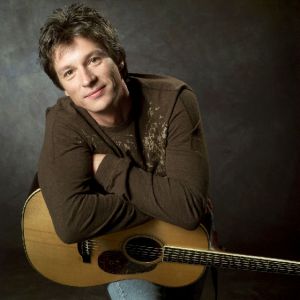Hailed as "one of bluegrass's most tender voices" by USA Today, Ronnie Bowman has spent his entire life making music, a quality you can hear in his voice, songs, and recorded and live performances. From singing and playing as a youth with his family's gospel group through his stints as a member of Lost & Found and Lonesome River Band into his solo career, the award-winning singer and artist as well as hit songwriter, has displayed a talent that catches the ear and burrows its way into the listener's heart.
That charm pervades his fourth solo album and first release for Koch Records Nashville, It’s Gettin’ Better All The Time. It's a work that both spans the range of bluegrass from traditional to contemporary and expands it into neighboring territories, continuing Bowman's stature at the cutting edge of today's acoustic music scene. The album features seven songs co-written by Bowman - including his recent No. 1 song for Brooks & Dunn, "It's Getting Better All The Time" - as well as three choice and diverse covers: his distinctive take on the Dolly Parton hit, "Old Flames (Can't Hold A Candle To You);" a hot bluegrass breakdown on "Walkin' The Dog," a classic hit for Webb Pierce that Bowman came across on a McPeak Brothers album; and Larry Rice's "Four Wheel Drive."
It’s Gettin’ Better All The Time was recorded in Nashville with members of his group The Committee - guitarist Wyatt Rice, dobro player Andy Hall, singer and fiddler Jeremy Garrett, and harmony singer Garnet Imes Bowman (also Ronnie's wife) - and a crew of noted musicians that includes special guests Del, Rob and Ronnie McCoury, Bowman's former LRB bandmate Dan Tyminski of Union Station, banjo master Don Wayne Reno, and top Nashville session ace John Jarvis. In addition to slices of prime bluegrass, the album boasts a splash of honky-tonk with the electric guitar and twin fiddles on "Build A Little Playhouse," summons up near cinematic atmosphere on "The Mountain," and spotlight's Bowman's wondrous vocals on his take of "It's Getting Better All The Time," backed only by Jarvis's piano and string arrangement. It's Bowman's most accomplished recording yet, and one that finds the bluegrass master in top form. "I just try to find or write the best songs and make it the best record I can," he says with characteristic modesty.
"Ever since I was old enough to remember, music has been a part of my life," Bowman explains. As a youth he sang with his family at churches across North Carolina and Virginia as well as frequent gatherings at their home. And thanks to his three older sisters, "I heard everything from Motown to Elvis to rock'n'roll - every kind of music you could think of."
In his late teens and early twenties, Bowman climbed the corporate ladder at the Sara Lee food conglomerate and limited his singing and playing to picking parties and jam sessions. "I would have always loved to have done music for a living, but I never had pursued it. It just kind of found me," he explains.
That happened in 1988, when he was asked to join Lost & Found and went professional. Two years later, he became a member of Lonesome River Band. With the first LRB album he appeared on, Carrying The Tradition, the group won Album of the Year honors in the International Bluegrass Musicians Awards, rising to become one of the top acts in the genre.
During his 11 years and four more albums with LRB, Bowman also started making solo recordings and sang with fellow band members Kenny Smith and Don Rigsby on John Fogerty's Full Moon Fever album. He cut his first solo set, 1994's Cold Virginia Night, because "I was just wanting to do some songs I liked and have something to sell when I was on the road and make a little extra money," Bowman says. It went on to win him three IBMA awards: Album of the Year, Male Vocalist of the Year, and Song of the Year for its title track. "Just the fact that it got nominated was bigger than I imagined. I was surprised and well pleased by how it did."
His second solo album in 1998, The Man I'm Trying to Be, won Bowman another Male Vocalist of the Year award as well as both Song of the Year and Gospel Recorded Performance of the Year for "Three Rusty Nails." By the dawn of the next decade, he had recorded a third solo collection, Starting Over, whose title proved to be prophetic.
"There was a song on it called 'Starting Over' and I thought it would make a good title," he remembers. By the time it was released in 2002, Bowman had left Lonesome River Band to start his own band, moved from Virginia to Nashville, signed a songwriter's deal with Sony/ATV Tree Publishing, and has his song "The Healing Kind" cut by Lee Ann Womack on her multi-million selling I Hope You Dance album, on which he also sang. "Who knew?" says Ronnie of what became a brand new start in his life.
And it remains a life where music is squarely at the center. "Somebody once said that if you can find something that you love to do, you'll never work another day in your life. This is what I love to do," he says. "Music is my life."

